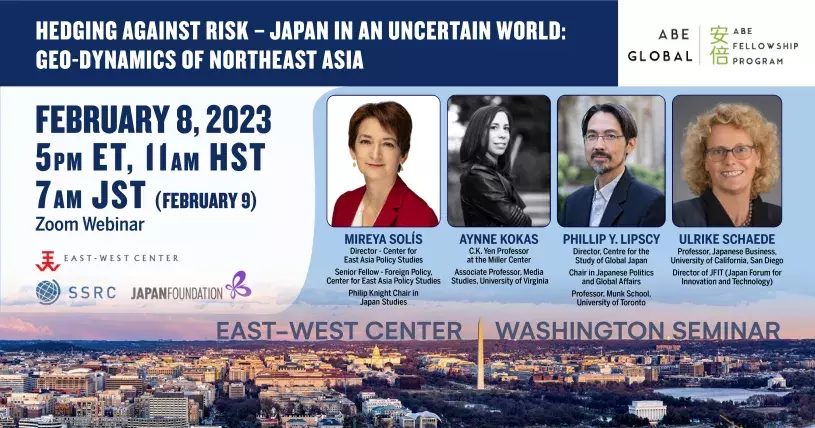
OFFICE/DEPARTMENT
The East-West Center in Washington, together with the Social Science Research Council and the Japan Foundation, held the 2023 Abe Fellows Global Forum:
Hedging Against Risk – Japan in an Uncertain World: Geo-Dynamics of Northeast Asia
A Conversation With:
Dr. Mireya Solís
Director & Senior Fellow, Center for East Asia Policy Studies
Philip Knight Chair in Japan Studies, Brookings Institution
Dr. Aynne Kokas
C.K. Yen Professor at the Miller Center
Associate Professor, Media Studies, University of Virginia
Dr. Phillip Y. Lipscy
Director, Centre for the Study of Global Japan
Chair in Japanese Politics and Global Affairs
Professor, Munk School, University of Toronto
Ulrike Schaede, PhD
Professor, Japanese Business, University of California, San Diego
Director of JFIT (Japan Forum for Innovation and Technology)
Dr. Satu P. Limaye (Moderator)
Vice President, East-West Center &
Director, Research Program and East-West Center in Washington
During the last decades of the twentieth century, there were major changes in the world economic organization as the end of the Cold War, the birth of the WTO, and the off-shoring of manufacturing to lower-wage developing countries created a highly integrated global economy dependent on complicated supply chains linking production and consumption. Similarly, sophisticated systems of data collection have distributed previously private or nationally-held data across state borders and spawned an industry around its global trafficking, resulting in security risks to individuals, businesses, and nations. A series of crises over the last several years—including the Covid pandemic, rising tensions between China and the US, natural disasters brought on by global warming, the war in Ukraine, and the sanctions regime—have shaken the globalized trading system and produced shortages in goods, energy, raw materials, food supplies, and labor. Access to these resources has become a strategic bargaining chip in international relations, as nations seek to secure supplies of food, raw materials, and energy in the global marketplace, while also ensuring that sensitive data is securely protected.
Panelists discussed questions about how nations hedge risks in a world in which the global flow of goods, data, and services is regularly interrupted by natural hazards, man-made conflict, and political relationships within the international order. How do these global and external issues impact domestic politics, and how do domestic issues impact the international world? And what is at stake?
SPEAKER BIOGRAPHIES
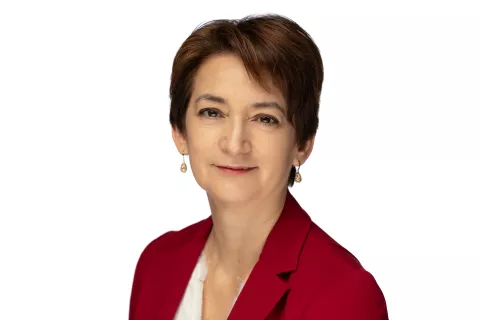
Mireya Solís is Director of the Center for East Asia Policy Studies (CEAP), Philip Knight Chair in Japan Studies, and senior fellow in the Foreign Policy program at Brookings. Prior to her arrival at Brookings, Dr. Solís was a tenured associate professor at American University’s School of International Service.
Dr. Solís is an expert on Japanese foreign economic policy, U.S.-Japan relations, international trade policy, and Asia-Pacific economic integration. Her book, “Dilemmas of a Trading Nation Japan and the United States in the Evolving Asia-Pacific Order” (Brookings Press, 2017 received the 2018 Masayoshi Ohira Memorial Award and the Japanese edition 貿易国家のジレンマ:日本・アメリカとアジア太平洋秩序の構築 was published by Nikkei Press in October 2019.
Solís earned a doctorate in government and a master's in East Asian studies from Harvard University, and a bachelor's in international relations from El Colegio de México.

Aynne Kokas is the C.K. Yen Professor at the Miller Center and an associate professor of media studies at the University of Virginia. Kokas’ research examines Sino-U.S. media and technology relations.
Her book Trafficking Data: How China is Winning the Battle for Digital Sovereignty (Oxford University Press, October 2022) argues that exploitative Silicon Valley data governance practices help China build infrastructures for global control. Her award-winning first book Hollywood Made in China (University of California Press, 2017) argues that Chinese investment and regulations have transformed the U.S. commercial media industry, most prominently in the case of media conglomerates’ leverage of global commercial brands.
Kokas is a non-resident scholar at Rice University’s Baker Institute of Public Policy, a life member of the Council on Foreign Relations, and a fellow in the National Committee on United States-China Relations’ Public Intellectuals Program. She has received fellowships from the Library of Congress, National Endowment for the Humanities, Mellon Foundation, Social Science Research Council, Woodrow Wilson Center for International Scholars, Japan’s Abe Fellowship, and other international organizations. Her writing and commentary have appeared globally in more than 50 countries and 15 languages. In the United States, her research and writing appear regularly in media outlets including CNBC, NPR’s Marketplace, The Washington Post, and Wired. She has testified before the Senate Finance Committee, House Foreign Affairs Committee, and the U.S. International Trade Commission.
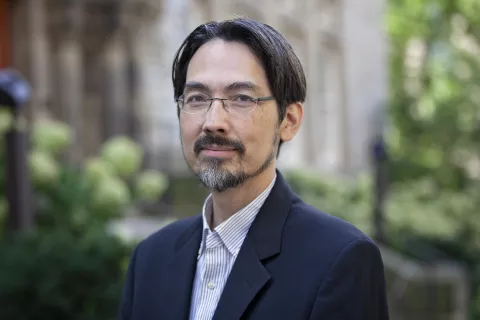
Phillip Y. Lipscy is professor of political science at the University of Toronto, where he is also Chair in Japanese Politics and Global Affairs and the Director of the Centre for the Study of Global Japan at the Munk School of Global Affairs & Public Policy. In addition, he is cross-appointed as professor at the Faculty of Law at the University of Tokyo. His research addresses substantive topics such as international cooperation, international organizations, the politics of energy and climate change, international relations of East Asia, and the politics of financial crises. He has also published extensively on Japanese politics and foreign policy. Lipscy obtained his Ph.D. in political science at Harvard University. He received his M.A. in international policy studies and B.A. in economics and political science at Stanford University.
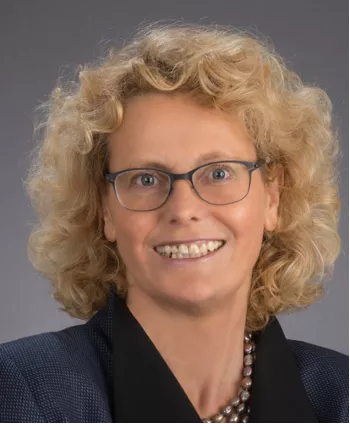
Ulrike Schaede, Ph.D., is Professor of Japanese Business at the University of California, San Diego, School of Global Policy and Strategy. She is the Director of JFIT (Japan Forum for Innovation and Technology) where she organizes a regular “Japan Zoominar” on current issues on Japanese business, politics, and society. She works on corporate strategy and management in Japan, including business culture, employment practices, financial markets, and manufacturing and innovation under the digital transformation. Dr. Schaede has written extensively on Japanese business organization, and is the author of The Business Reinvention of Japan: How to Make Sense of the New Japan(Stanford University Press, 2020), which won the 2021 Masayoshi Ohira Memorial Prize and has been translated into Japanese as 再興 THE KAISHA:日本のビジネス・リインベンション (Nikkei 2022). She has also co-authored 両利きの組織をつくる:大企業病を打破する「攻めと守りの経営」Tokyo 2020, Eiji Shuppan (with Masanori Kato and Charles A. O’Reilly III), and The Digital Transformation and Japan’s Political Economy (Cambridge UP 2022, with Kay Shimizu). Dr. Schaede holds a M.A. from Bonn University, and a Ph.D. from Marburg University, both in Japan Studies and Economics. She has been invited to visiting professor and visiting scholar positions at UC Berkeley, Harvard Business School, Stanford University in the U.S., and in Japan at Hitotsubashi University and the research institutes of The Bank of Japan, The Ministry of Economy, Trade and Industry, the Ministry of Finance, and the Development Bank of Japan. All told, Schaede has spent over nine years of research in Tokyo. Among others, she is a member of the advisory board of the National Bureau of Research on Asia, Seattle, and the Industrial Growth Platform, Inc. (IGPI), Tokyo, and a research fellow and supporter of two startup incubators in Japan.
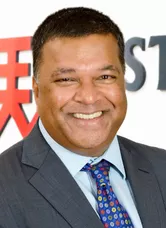
Satu P. Limaye is Vice President of the East-West Center and the Director of the East-West Center’s Research program and Washington office, where he created and now directs the Asia Matters for America initiative and is the founding editor of the Asia Pacific Bulletin. He is also a Senior Advisor at CNA Corp (Center for Naval Analyses). He is a graduate of Georgetown University and received his doctorate from Oxford University (Magdalen College) where he was a George C. Marshall Scholar. He publishes and speaks widely on Indo-Pacific regional issues and supports various U.S. government, foundation, fellowship, and professional organizations. Among his current affiliations are Center for New American Security (CNAS) Task Force on the U.S.-Philippines Alliance, United States Institute of Peace (USIP) Senior Study Group on the North Pacific, Project 2049 Study Group on the U.S.-Australia Alliance, Korea Economic Institute (KEI) Advisory Council, and Global Taiwan Institute-Taiwan Asia Exchange Foundation project. Recent publications include: Southeast Asia’s choices: Economic, political, and geopolitical integration face complications, India in East Asia: Focused on the Quad and Border Disputes with China, and Maintaining the Technology Edge: Strengthening US and Indo-Pacific Alliances to Counter Chinese Technology Acquisition (with Rose Tenyotkin).
The East-West Center in Washington, together with the Social Science Research Council and the Japan Foundation, held the 2023 Abe Fellows Global Forum:
Hedging Against Risk – Japan in an Uncertain World: Geo-Dynamics of Northeast Asia
A Conversation With:
Dr. Mireya Solís
Director & Senior Fellow, Center for East Asia Policy Studies
Philip Knight Chair in Japan Studies, Brookings Institution
Dr. Aynne Kokas
C.K. Yen Professor at the Miller Center
Associate Professor, Media Studies, University of Virginia
Dr. Phillip Y. Lipscy
Director, Centre for the Study of Global Japan
Chair in Japanese Politics and Global Affairs
Professor, Munk School, University of Toronto
Ulrike Schaede, PhD
Professor, Japanese Business, University of California, San Diego
Director of JFIT (Japan Forum for Innovation and Technology)
Dr. Satu P. Limaye (Moderator)
Vice President, East-West Center &
Director, Research Program and East-West Center in Washington
During the last decades of the twentieth century, there were major changes in the world economic organization as the end of the Cold War, the birth of the WTO, and the off-shoring of manufacturing to lower-wage developing countries created a highly integrated global economy dependent on complicated supply chains linking production and consumption. Similarly, sophisticated systems of data collection have distributed previously private or nationally-held data across state borders and spawned an industry around its global trafficking, resulting in security risks to individuals, businesses, and nations. A series of crises over the last several years—including the Covid pandemic, rising tensions between China and the US, natural disasters brought on by global warming, the war in Ukraine, and the sanctions regime—have shaken the globalized trading system and produced shortages in goods, energy, raw materials, food supplies, and labor. Access to these resources has become a strategic bargaining chip in international relations, as nations seek to secure supplies of food, raw materials, and energy in the global marketplace, while also ensuring that sensitive data is securely protected.
Panelists discussed questions about how nations hedge risks in a world in which the global flow of goods, data, and services is regularly interrupted by natural hazards, man-made conflict, and political relationships within the international order. How do these global and external issues impact domestic politics, and how do domestic issues impact the international world? And what is at stake?
SPEAKER BIOGRAPHIES

Mireya Solís is Director of the Center for East Asia Policy Studies (CEAP), Philip Knight Chair in Japan Studies, and senior fellow in the Foreign Policy program at Brookings. Prior to her arrival at Brookings, Dr. Solís was a tenured associate professor at American University’s School of International Service.
Dr. Solís is an expert on Japanese foreign economic policy, U.S.-Japan relations, international trade policy, and Asia-Pacific economic integration. Her book, “Dilemmas of a Trading Nation Japan and the United States in the Evolving Asia-Pacific Order” (Brookings Press, 2017 received the 2018 Masayoshi Ohira Memorial Award and the Japanese edition 貿易国家のジレンマ:日本・アメリカとアジア太平洋秩序の構築 was published by Nikkei Press in October 2019.
Solís earned a doctorate in government and a master's in East Asian studies from Harvard University, and a bachelor's in international relations from El Colegio de México.

Aynne Kokas is the C.K. Yen Professor at the Miller Center and an associate professor of media studies at the University of Virginia. Kokas’ research examines Sino-U.S. media and technology relations.
Her book Trafficking Data: How China is Winning the Battle for Digital Sovereignty (Oxford University Press, October 2022) argues that exploitative Silicon Valley data governance practices help China build infrastructures for global control. Her award-winning first book Hollywood Made in China (University of California Press, 2017) argues that Chinese investment and regulations have transformed the U.S. commercial media industry, most prominently in the case of media conglomerates’ leverage of global commercial brands.
Kokas is a non-resident scholar at Rice University’s Baker Institute of Public Policy, a life member of the Council on Foreign Relations, and a fellow in the National Committee on United States-China Relations’ Public Intellectuals Program. She has received fellowships from the Library of Congress, National Endowment for the Humanities, Mellon Foundation, Social Science Research Council, Woodrow Wilson Center for International Scholars, Japan’s Abe Fellowship, and other international organizations. Her writing and commentary have appeared globally in more than 50 countries and 15 languages. In the United States, her research and writing appear regularly in media outlets including CNBC, NPR’s Marketplace, The Washington Post, and Wired. She has testified before the Senate Finance Committee, House Foreign Affairs Committee, and the U.S. International Trade Commission.

Phillip Y. Lipscy is professor of political science at the University of Toronto, where he is also Chair in Japanese Politics and Global Affairs and the Director of the Centre for the Study of Global Japan at the Munk School of Global Affairs & Public Policy. In addition, he is cross-appointed as professor at the Faculty of Law at the University of Tokyo. His research addresses substantive topics such as international cooperation, international organizations, the politics of energy and climate change, international relations of East Asia, and the politics of financial crises. He has also published extensively on Japanese politics and foreign policy. Lipscy obtained his Ph.D. in political science at Harvard University. He received his M.A. in international policy studies and B.A. in economics and political science at Stanford University.

Ulrike Schaede, Ph.D., is Professor of Japanese Business at the University of California, San Diego, School of Global Policy and Strategy. She is the Director of JFIT (Japan Forum for Innovation and Technology) where she organizes a regular “Japan Zoominar” on current issues on Japanese business, politics, and society. She works on corporate strategy and management in Japan, including business culture, employment practices, financial markets, and manufacturing and innovation under the digital transformation. Dr. Schaede has written extensively on Japanese business organization, and is the author of The Business Reinvention of Japan: How to Make Sense of the New Japan(Stanford University Press, 2020), which won the 2021 Masayoshi Ohira Memorial Prize and has been translated into Japanese as 再興 THE KAISHA:日本のビジネス・リインベンション (Nikkei 2022). She has also co-authored 両利きの組織をつくる:大企業病を打破する「攻めと守りの経営」Tokyo 2020, Eiji Shuppan (with Masanori Kato and Charles A. O’Reilly III), and The Digital Transformation and Japan’s Political Economy (Cambridge UP 2022, with Kay Shimizu). Dr. Schaede holds a M.A. from Bonn University, and a Ph.D. from Marburg University, both in Japan Studies and Economics. She has been invited to visiting professor and visiting scholar positions at UC Berkeley, Harvard Business School, Stanford University in the U.S., and in Japan at Hitotsubashi University and the research institutes of The Bank of Japan, The Ministry of Economy, Trade and Industry, the Ministry of Finance, and the Development Bank of Japan. All told, Schaede has spent over nine years of research in Tokyo. Among others, she is a member of the advisory board of the National Bureau of Research on Asia, Seattle, and the Industrial Growth Platform, Inc. (IGPI), Tokyo, and a research fellow and supporter of two startup incubators in Japan.

Satu P. Limaye is Vice President of the East-West Center and the Director of the East-West Center’s Research program and Washington office, where he created and now directs the Asia Matters for America initiative and is the founding editor of the Asia Pacific Bulletin. He is also a Senior Advisor at CNA Corp (Center for Naval Analyses). He is a graduate of Georgetown University and received his doctorate from Oxford University (Magdalen College) where he was a George C. Marshall Scholar. He publishes and speaks widely on Indo-Pacific regional issues and supports various U.S. government, foundation, fellowship, and professional organizations. Among his current affiliations are Center for New American Security (CNAS) Task Force on the U.S.-Philippines Alliance, United States Institute of Peace (USIP) Senior Study Group on the North Pacific, Project 2049 Study Group on the U.S.-Australia Alliance, Korea Economic Institute (KEI) Advisory Council, and Global Taiwan Institute-Taiwan Asia Exchange Foundation project. Recent publications include: Southeast Asia’s choices: Economic, political, and geopolitical integration face complications, India in East Asia: Focused on the Quad and Border Disputes with China, and Maintaining the Technology Edge: Strengthening US and Indo-Pacific Alliances to Counter Chinese Technology Acquisition (with Rose Tenyotkin).












